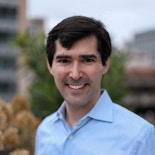
Max Staller, Ph.D.
Assistant Professor in Residence, University of California, Berkeley
SFARI Investigator WebsiteTranscription factors activate gene expression by binding the genome with DNA binding domains and recruiting coactivators with activation domains. Max Staller’s research objective is to build a family of computational models that predict activation domains from protein sequence and predict how mutations in activation domains modulate activity. These models will annotate activation domains on transcription factors across genomes, reveal how transcription factors evolve, aid the reconstruction of gene regulatory networks, and interpret how human genetic variation in transcription factors modulates protein function.
The Staller lab integrates high-throughput experiments, machine learning, biophysical simulations and high-resolution imaging to study activation domains. This work exemplifies how understanding the molecular mechanisms of activation domain function has improved computational predictors.
Staller was a member of the first cohort of the Integrated Science Curriculum at Princeton University, a program that combined introductory physics, chemistry, computer science and biology. He completed his senior thesis with David Botstein. In the systems biology Ph.D. program at Harvard University, he worked with Angela DePace to measure and model how enhancers generate spatial gene expression patterns in the fly embryo. Staller’s dissertation demonstrated how two enhancers can use different input transcription factors to compute the same output pattern, which constituted the first example of parallel processing in an embryo. Staller pursued his postdoctoral training at Washington University in St. Louis School of Medicine working with Barak Cohen and Rohit Pappu. There, he developed methods and computational models to study transcriptional activation domains in high throughput.
Staller is a Hispanic scientist (Venezuelan-American) with a track record of mentoring undergraduate and postbaccalaureate students from backgrounds traditionally underrepresented in science fields. In 2019, he received the inaugural Outstanding Postdoc Mentor or Teacher Award from the Postdoc Society at Washington University in St. Louis.
